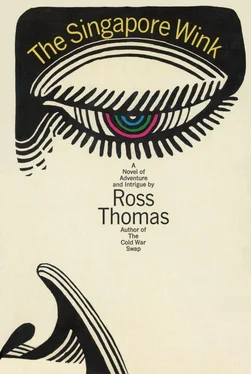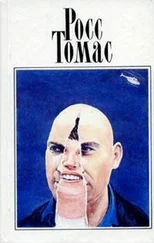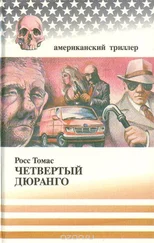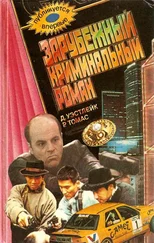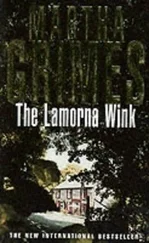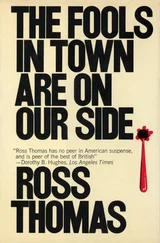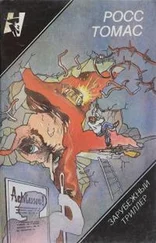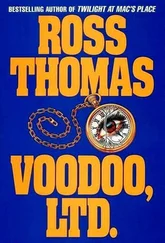Lim paused and smiled again. “I suppose one could say that I am Singapore’s secret service.”
“Then it doesn’t seem to be much of a secret.”
“Oh, it isn’t. It isn’t at all. Everyone knows it and sometimes we all joke about it. But someone had to do it and the Prime Minister decided that I was the one.”
“Why you?”
“Because, I would say, I can afford it.”
I took a deep breath. “I beg your pardon, Mr. Lim, but does this bring us any closer to Angelo Sacchetti?”
He nodded. “Indeed it does. I became interested in Mr. Sacchetti when he turned up here a year and a half ago after he had drowned in our harbor.” Lim reached into his desk and brought out a manila folder and flipped through it. “I believe you were involved in that so-called accident, Mr. Cauthorne?”
“You know I was.”
“Yes. There’s a report on it here and then Dickie refreshed my memory when I spoke to him last night. Refreshed my memory! My word, I’m beginning to sound like a policeman or a spy or something equally sinister.”
“What about Sacchetti?” I said.
“He turned up here, back from the dead, as it were, a year and a half ago. He arrived on a flight from Hong Kong and his perfectly valid passport indicated that he had spent some time in the Philippines. Cebu City, I believe. Yes, here it is in the file.” Lim moved his finger down the page of the file he held before him. “He opened a rather large account with a draft from a Swiss bank, rented a luxurious apartment, and proceeded to become quite social.”
“Then what?”
“Then a most curious thing happened. It seems that almost everyone in Singapore began to select a combination of three numbers and wager small sums that this number would turn up the following day as the last three digits on the totalizators either at the Singapore Turf Club or the race courses in Malaya or even in Hong Kong.”
“Totalizators?” I said.
“Yes,” Lim said. “I believe you call them parimutuel machines in the U.S.”
“I believe we do.”
“Well, up until then our gambling (and we Chinese are incurable gamblers) had been dominated by our so-called secret societies. At last count, I think there were about three hundred fifty of them. They not only ran the gambling, but also prostitution, what’s left of the opium trade, most of the smuggling, and just about everything else that might be described as illegal — even a bit of piracy.”
“You said up until then.”
“Yes, I did,” Lim said. “It seems that these small bets on the combination of race course digits are now being collected by hitherto unemployed youngsters, juvenile delinquents, I think one could call them, who have banded together in packs and describe themselves as the Billy the Kid Gang or the Yankee Boys or even Hell’s Angels.”
“We try to spread our culture around.”
Lim smiled. “The films do it: that and television. At any rate, our Criminal Investigation Department has got onto it and they’ve found that an extraordinary amount of money is being collected daily by these youngsters.”
“How much?” I asked.
“Around one hundred thousand dollars a day.”
“That’s about thirty-three thousand, American.”
“Yes.”
“Are there payoffs?”
“I beg your pardon,” Lim said.
“Does anyone ever win?”
“Oh, to be sure. People win every day.”
“What are the odds?”
Lim turned to his file again. “I’ll have to look it up. Yes, here it is. The payoff, as you call it, is four hundred to one.”
“That’s low,” I said.
“How?”
“The real odds are about six hundred to one. Whoever’s running it is skimming about two hundred dollars off the top of each hit.”
“Interesting,” Lim murmured. “I’ll make a note of that.” And he did.
“Let me guess,” I said. “You found that the numbers racket was set up by Angelo Sacchetti.”
Lim nodded. “Yes, and he has it quite well organized. Not only that, but he’s gone into several other activities. For instance, if a merchant doesn’t pay a certain weekly sum, he finds his establishment vandalized.”
“What about your secret societies? Don’t they resent an outsider moving in?”
The Lucky Strikes were offered again by Lim and once again I accepted one because it made him feel better. “At first,” he said. “Then there were a couple of mysterious deaths and the societies’ opposition seemed to diminish. Considerably. The deaths were, I believe, most painful.”
“Why don’t you just throw him out?” I said.
“Sacchetti?”
“Yes.”
Lim inhaled his cigarette and blew out a thin stream of smoke. “I’m afraid, Mr. Cauthorne, that it’s not as simple as that.”
“Why? He’s a foreigner. Just don’t renew his visa.”
“Yes, he is a foreigner, but Mr. Sacchetti married just after he arrived here.”
“So I heard.”
“Did you hear whom he married?”
“No.”
“It was the daughter of one of our leading citizens who is quite active in politics. He has used his considerable influence to prevent any move being made against his new son-in-law.”
“What was it, love at first sight?”
Lim shook his head slowly. “No, I don’t believe so. I understand that Mr. Sacchetti paid a little over three hundred thousand American dollars for the hand of his bride.”
Lim told me the rest of it. After Angelo Sacchetti came back from the dead, via Cebu City and Hong Kong, he gave what amounted to a marathon party that lasted for almost a month. It went on night and day in his fashionable apartment, an open house for friends who brought friends who, in turn, brought their friends and eventually Sacchetti met the persons that he wanted to meet, the minor politicians who might be bought and the hard cases who were not at all averse to expanding their activities if there were prospect of a tidy profit. Sacchetti simply showed them how to make it faster.
He also made a few enemies along the way, but opposition melted after two of his more intransigent opponents were found, floating face-down in the Singapore River. The secret societies, badly fragmented, backed Sacchetti as long as he didn’t interfere with their indent graft and as long as they received a cut from the proceeds. The only real opposition was the Singapore government and Sacchetti fixed that by marrying the youngest daughter of Toh Kin Pui, a politician who had a large and extremely left-wing following, and who just happened to be down on his luck at the time.
“Mr. Toh now espouses his rather China-oriented political philosophy from the back seat of a handsome Rolls-Royce which his son-in-law gave him for his birthday,” Lim said. “Although we can’t prove it, we strongly suspect that a percentage of Mr. Sacchetti’s profits are being channeled into his father-in-law’s political war chest. By now, I rather think that the chest is almost full.”
“What will he do with it — buy votes?”
Lim shook his head. “No, there’s no election for another four years and the Prime Minister’s party now controls every seat in Parliament — fifty-one out of fifty-one, a most regrettable situation.”
“Why?”
“You need some opposition, you know. Otherwise your own politicians will have nothing to rail against. Suppose, for example, that your Democrats suddenly won every seat in your Congress.”
“They’d fight with each other,” I said.
“Exactly. That’s why Toh is useful to the government. He provides a target, a whipping boy, and Lord knows one is needed.”
“But he has no real power?” I said.
“Yes, Mr. Cauthorne, he has power. With the money he now controls he can launch a full-scale race riot whenever he chooses. That’s the threat that Angelo Sacchetti’s father-in-law holds over our government, and it’s a gravely serious one. We simply cannot afford another riot at this time.”
Читать дальше
